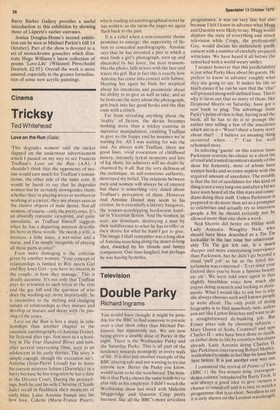Television
Double Parky
Richard Ingrams
You would have thought it might be possible for the BBC to find someone to preside over a chat show other than Michael Parkinson, but apparently not. We are now being given a double (lose of Perky in the night. There isehe Wednesday Perky and the Saturday Perky, This is all part of the tendency towards monopoly in every walk of life. It is also just another example of the BBC playing safe and not wanting to tryout anyone new. Better the Perky you know, would seem to be the watchword. The trouble is that Perky shows the same tendency to play safe as his employer. I didn't watch the Wednesday show last week with Malcolm Muggeridge and Quentin Crisp partly because, like all the BBC's more articulate programmes, it was on very late but also because I felt I knew in advance what Mum and Quentin were likely to say. Mugg would deplore the state of everything and attack television while Crispy, the professional Gay, would discuss his melancholy predicament with a number of carefully prepared witticisms. We have heard it all before (he remarked with a world-weary smile).
I suspect however that this predictability is just what Parky likes about his guests. He prefers to know in advance roughly what they are going to say. It makes his life so Much easier if he can be sure that the 'chat' will proceed along well-defined lines, This is why it turns out that so many of them, like Desmond Morris on Saturday, have got a new book to plug. The advantage from Perky's point of view is that, having read the book, all he has to do is to prompt the author into telling a few of the anecdotes which are in it — 'Wasn't there a funny Story about that?. .. I believe an amusing thing occurred when . ?" Cue for well rehearsed story. In selecting 'guests' on this narrow basis Parkinson restricts his choice to a short list of tried and trusted raconteurs mainly of the show biz fraternity, most of whom have written books and so come replete with the required amount of anecdotes. The trouble is that the list of candidates for this kind of thing is not a very long one and after a bit vie have soon heard all the film stars and comedians doing their stuff. Unless Parkinson is prepared to do more than act as a prompter to celebrities and actually try to interview people a bit he should certainly not be allowed more than one show a week.
Ned Sherrin did better on Friday with Lady Antonia. Naughty Ned, who should have been described as a Tin Till lookalike in the last issue but unaccountably Tin Tin got left out, is a much sharper and more entertaining interviewer than Parkinson, but he didn't go beyond a ritual 'puff job' as far as the titled histofianette was concerned— 'Ever since your Oxford days you've been a famous beautY etc etc'. We were told once again in that slightly breathless voice how much she enjoys doing research and looking at documents. What I would like to ask her is why she always chooses such well known people to write about. The only point of doing biography is to find somebody new, unless you are like Lytton Strachey and want to do a straightforward de-bunking job. But Fraser plays safe by choosing subjects — Mary Queen of Scots, Cromwell and now Charles II — who have been done to death, or rather done to life by countless historians already. Lady Antonia doing Charles like Parkinson interviewing Robert Morley, is calculated to make us feel that we have bee° here before. It is just another easy way out.
I commend the revival of Points of View (BBC-I ) the five-minute-long 'correspondence column' introduced by Barry Took. It was always a good idea to give viewers a chance to sound off and it is nice to watch a programme that is so short. Needless to say it is only shown on the London Wavelength.


































 Previous page
Previous page